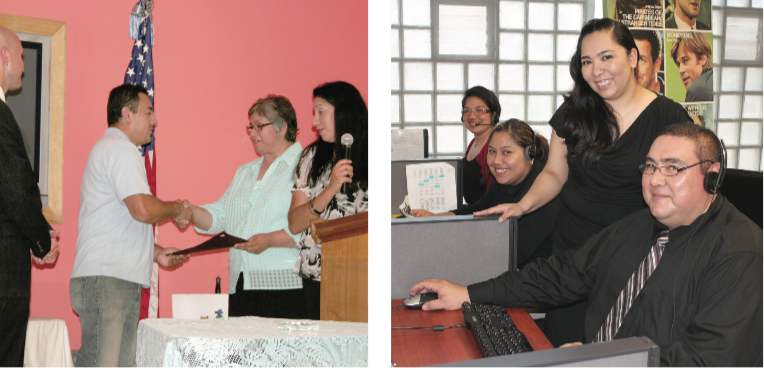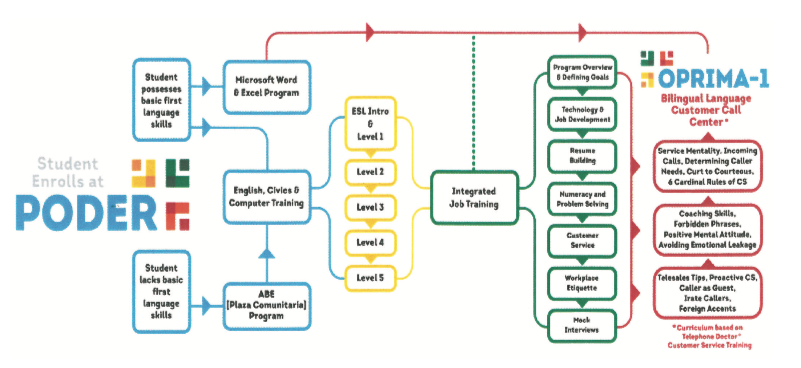UnidosUS profiles the Oprima-1 model, providing other social enterprises with best practices on how to ensure their implementation model is both fiscally and programmatically sound.
PODER Chicago, Illinois
Background
PODER prepares Spanish-speaking adult immigrants to seize opportunities in Chicago through comprehensive, tuition-free English education and job training programs. PODER’s professional, disciplined approach ensures that all students learn to understand and communicate in English to confidently navigate daily life. Every student who commits to PODER’s positive and disciplined learning environment is empowered to build a successful life in Chicago. As students advance in PODER’s English program, they become eligible for Oprima-1, a bilingual customer service job training program, that prepares them to enter Chicago’s labor market within industries where bilingual employee demand is high.
Program Need
PODER launched its bilingual customer service training program through its social enterprise, Oprima-1, in 2012 after two years of planning. In 2010, PODER noticed a sharp decrease in student attendance and an increase in dropout rates from its ESL classes. Upon evaluation, PODER realized that students were inconsistently attending classes or dropping out because they were forced to prioritize supporting their families over completing their education. PODER understood that to ensure students were gaining English-language skills, which they needed desperately to advance academically and economically, it needed to provide them with some sort of job training program with paid employment opportunities. After much research, PODER decided to utilize a transitional jobs program model where students would receive training through Oprima-1 as they received bilingual customer service training in the context of a call center.

Program Design
Oprima-1 is the capstone of an ESL/civics program that provides participants with a unique opportunity
to gain technical skills while working in a transitional job that pays real wages. Oprima-1, a work-
study program, prepares students for full-time employment while they gain English-language,
telecommunication, and customer service skills. As students advance through PODER’s English-language
training, they may enroll in Oprima-1 if they are interested and eligible. All students at PODER and
Oprima-1 receive case management and academic and career counseling. Case managers work with each
student to identify and address obstacles and then offer the support and services they need to ensure
success.
PODER accepts all students at all levels into its ESL/civics program, but in order to participate in Oprima-1, all must have legal work permission. After initial assessments and meetings with case managers for academic and career counseling, students are placed in the English class based on proficiency level. Students are expected to commit to their studies and contribute to a positive, motivational culture. All programs are for adults only, focusing resources and limiting distractions. Students do not need to have a high school diploma or GED to be in the training program.
Oprima-1 training is composed of three phases:
- Phase I: ESL/civics (provided through PODER)
- Phase II: Customer service training and transitional employment (provided through Oprima-1)
- Phase III: Job placement and support (provided through Oprima-1) During the ESL/civics phase, students attend PODER classes on Monday through Thursday for two hours daily during each 16-week trimester. There are six levels of ESL/civics classes. Once enrolled in an ESL class, if eligible and interested, students may enroll in Oprima-1’s transitional job program. Students then continue with their English classes in the morning and learn customer service skills through the on-site call center. Students start out practicing their customer service skills on the phone in Spanish as call center associates and then gradually shift to English as they gain English-language skills. Students earn $9 per hour during their call center customer service training. Upon program completion, they advance to working at the call center for a few additional weeks before being placed into permanent employment. PODER secured a sponsorship from the International Customer Management Institute, a call center certification/training association that connected PODER with national outsourcers. One of these was a call center in Wisconsin with a client in the cable industry. This call center and the cable industry client served as a pilot for Oprima-1. After the initial year of operation, Oprima-1 secured clients in community clinics that needed outreach and in-person counselor scheduling for the Affordable Care Act, insurance agencies that needed client follow-up, lead generation for international trade associations, and more. Finding clients for Oprima-1 has been the most challenging part of the business. When call volume drops, Oprima-1 initiates community outreach efforts with its advocates (both on the phone and in person) to recruit new ESL/civics and Oprima-1 participants.

Program Services
While students are in Oprima-1, they receive employment services that include updating their
resume, filling out online job applications, mock interviews, referrals to job openings, and networking
opportunities. Students meet with their case managers once every two weeks and discuss their
employment options. Once a student is placed on the job, case managers provide regular follow-up at 30
days, 90 days, and beyond to ensure student success.
Employer Relationships
Oprima-1’s employer partners include insurance agencies, third-party call centers, community clinics, and local grocery stores. Due to ongoing contract work and nondisclosure agreements, Oprima-1 is unable to share employer names. Oprima-1 continues to search for new clients to scale this innovative transitional jobs program model. Current call center capacity is 20 seats, but with increased call volume PODER will expand operations to provide more students with opportunities to acquire English-language skills as they gain technical training and get paid in the process. Through a collaboration with a national insurance agency based in Illinois, PODER is also developing a training program that would license advocates in casualty and liability.
Outcomes
Program graduates find work in a variety of sectors. PODER encourages students to seek environments where their bilingual skills are an asset. Students have found employment as receptionists, call center representatives, retail associates, and even recruitment managers. PODER works with all establishments that value Spanish skills. Students on average earn $11.30 per hour upon initial placement. One hundred percent of program graduates to date have been placed by PODER, and many have already advanced in their jobs, bringing them closer to family-sustaining wages.

